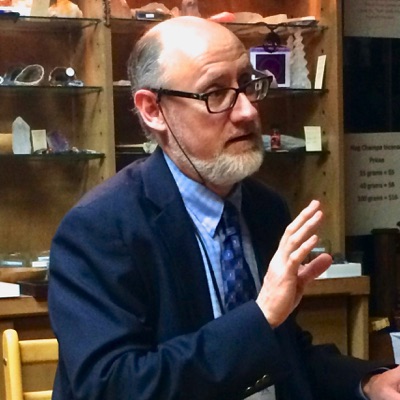Q: It seems like everyone is jumping on the McMindfulness bandwagon. Should teaching mindfulness be regulated?
“No.
“Let the free marketplace of ideas prevail.
“You should be the one to decide if you are getting what you need from your mindfulness teacher, not some academic board.
“Healthy debate and spirited criticism can help the consumer sort out who is speaking psychobabble, and who is speaking about real world results in the everyday world that you and I live in.”
Q: How is B-Sync Mindfulness practice different from any other form of mindfulness practice?
“Two ways: Purpose and Approach.
“B-Sync Mindfulness has Purpose.
“The life you get is equal to the guidance of your nonconscious mind minus the interference of your brain.
“Your nonconscious mind is far better informed than your brain, but research shows your brain gets to decide which information it chooses to act upon.
“The purpose of B-Sync Mindfulness is to sync your brain with your nonconscious mind so that they work together to give you the life you really want.
“B-Sync Mindfulness has a breakthrough approach that gives you the same benefits as generic mindfulness and more.
“You don’t try to learn mindfulness.
“You coach your brain to learn mindfulness!
“It is your brain that practices mindfulness, not you.
“That changes everything.”
Copyright 2018 by Peter M Fellows. All Rights Reserved.
PETER ANSWERS
THE CRITICAL QUESTIONS ABOUT MINDFULNESS
Q: All we seem to hear about are the wonderful benefits of mindfulness. Isn’t there a danger in mindfulness being perceived as a cure-all?
“Mindfulness is very popular and therefore it is the subject of a tremendous number of studies.
“And what the research finds is that when people practice mindfulness they experience less stress in their lives.
“Much of our health issues, from high blood pressure to headaches, to even more serious illnesses, are either caused by, or made worse by, stress.
“So since practicing mindfulness reduces stress you get all these stress-related ailments improving. That’s what makes it look like a cure-all.”
Q: Some experts are advocating that mindfulness be taught to school children. Should we allow what is essentially a Buddhist religious practice to be taught in public schools?
“We mustn’t confuse the tool with the beliefs of the person using the tool. Hindus also practice mindfulness, as do Navy SEALs, and Astronauts.
“Teaching school children how to pay attention to what’s being taught, to what they are thinking and feeling, and to how they are behaving, is probably a good thing.
“Research seems to suggest this is so.”

Peter M Fellows
B-SYNC NATION: Where You Achieve Success by Coaching Your Brain and Helping Others Do the Same!
Text me at: 914 - 275 - 8238
Email me at: petermfellows@gmail.com



Q: Everyone talks about the benefits of mindfulness. Are there any negative side effects to mindfulness?
“No.
“Some critics are worried that if you spend time noticing your thoughts, you might get upset if you become aware of some repressed negative feelings.
“That’s not a side effect of mindfulness, because in mindfulness you do not resist what you experience.
“It’s a bit like saying that a negative side effect of cleaning up might be discovering you’re a hoarder!
“Those feelings are caused by being unmindful for a long period of time.”

Q. Aren’t corporations taking a spiritual practice and corrupting it by using it just to make more money?
“No.
“What motivates any corporation to provide their employees with mindfulness training is as varied and multi-faceted as what motivates any individual to use mindfulness.
“Mindfulness is not inherently a spiritual practice. That is just one specific use of mindfulness.
“It can be used to enhance your spiritual path, or your professional path.
“You decide what you want to use it for.
“The research seems to show, however, that practicing mindfulness is good for employees. It makes them happier and healthier.
“Should we discourage corporations from offering something that makes employees happier and healthier just because the side effect is that it makes the company more profitable?
“That’s actually how we want corporations to behave. We want them to find ways of making profit which also benefit other stakeholders like the employees and the greater community.”

